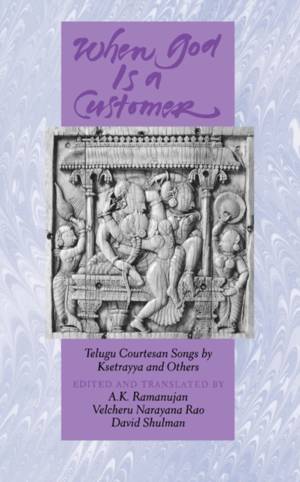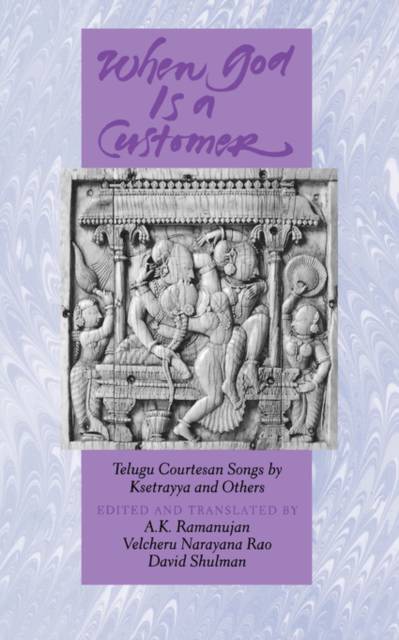
- Afhalen na 1 uur in een winkel met voorraad
- Gratis thuislevering in België vanaf € 30
- Ruim aanbod met 7 miljoen producten
- Afhalen na 1 uur in een winkel met voorraad
- Gratis thuislevering in België vanaf € 30
- Ruim aanbod met 7 miljoen producten
Zoeken
When God is a Customer
Telugu Courtesan Songs by Ksetrayya and Others
A K Ramanujan, Velcheru Narayana Rao, David Shulman
Paperback | Engels
€ 54,45
+ 108 punten
Omschrijving
How is it that this woman's breasts glimmer so clearly through her saree? Can't you guess, my friends? What are they but rays from the crescents left by the nails of her lover pressing her in his passion, rays now luminous as the moonlight of a summer night?
These South Indian devotional poems show the dramatic use of erotic language to express a religious vision. Written by men during the fifteenth to eighteenth century, the poems adopt a female voice, the voice of a courtesan addressing her customer. That customer, it turns out, is the deity, whom the courtesan teases for his infidelities and cajoles into paying her more money. Brazen, autonomous, fully at home in her body, she merges her worldly knowledge with the deity's transcendent power in the act of making love.
This volume is the first substantial collection in English of these Telugu writings, which are still part of the standard repertoire of songs used by classical South Indian dancers. A foreword provides context for the poems, investigating their religious, cultural, and historical significance. Explored, too, are the attempts to contain their explicit eroticism by various apologetic and rationalizing devices.
The translators, who are poets as well as highly respected scholars, render the poems with intelligence and tenderness. Unusual for their combination of overt eroticism and devotion to God, these poems are a delight to read.
These South Indian devotional poems show the dramatic use of erotic language to express a religious vision. Written by men during the fifteenth to eighteenth century, the poems adopt a female voice, the voice of a courtesan addressing her customer. That customer, it turns out, is the deity, whom the courtesan teases for his infidelities and cajoles into paying her more money. Brazen, autonomous, fully at home in her body, she merges her worldly knowledge with the deity's transcendent power in the act of making love.
This volume is the first substantial collection in English of these Telugu writings, which are still part of the standard repertoire of songs used by classical South Indian dancers. A foreword provides context for the poems, investigating their religious, cultural, and historical significance. Explored, too, are the attempts to contain their explicit eroticism by various apologetic and rationalizing devices.
The translators, who are poets as well as highly respected scholars, render the poems with intelligence and tenderness. Unusual for their combination of overt eroticism and devotion to God, these poems are a delight to read.
Specificaties
Betrokkenen
- Auteur(s):
- Uitgeverij:
Inhoud
- Aantal bladzijden:
- 158
- Taal:
- Engels
Eigenschappen
- Productcode (EAN):
- 9780520080690
- Verschijningsdatum:
- 15/04/1994
- Uitvoering:
- Paperback
- Formaat:
- Trade paperback (VS)
- Afmetingen:
- 141 mm x 203 mm
- Gewicht:
- 217 g

Alleen bij Standaard Boekhandel
+ 108 punten op je klantenkaart van Standaard Boekhandel
Beoordelingen
We publiceren alleen reviews die voldoen aan de voorwaarden voor reviews. Bekijk onze voorwaarden voor reviews.











